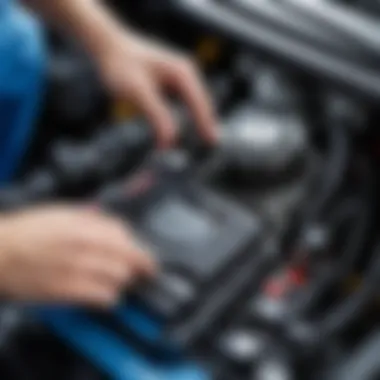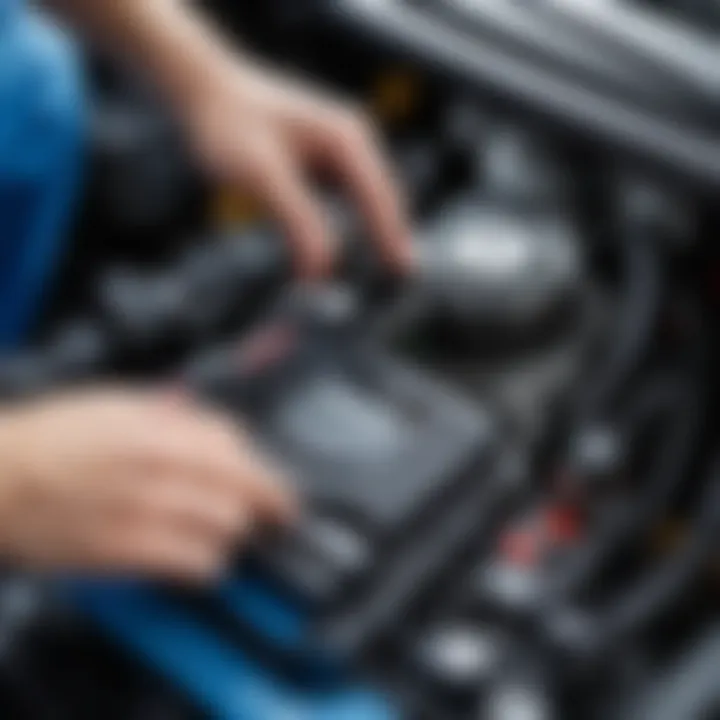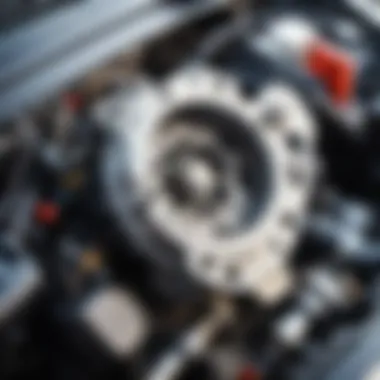Diagnosing Cold Engine Misfires in Matiz Vehicles


Обзор автомобиля
The Matiz, a compact city car, has carved its niche in the automotive landscape thanks to its affordability and practicality. This vehicle, often seen darting through urban landscapes, attracts a diverse crowd—ranging from youthful drivers looking for cost-effective transportation to mechanics hunting for reliable workhorses. Understanding the nuances of engine performance in this iconic model is crucial, particularly when addressing issues like cold engine misfires.
Основные характеристики
The Matiz boasts a lightweight frame combined with a surprisingly spacious interior, making it maneuverable in tight spaces while ensuring comfort for its passengers. Its fuel efficiency is commendable, often stretching a liter of petrol over many distances, a feature appreciated by both city dwellers and savvy travelers alike. The car deftly balances style and functionality, with features befitting its status as an urban favorite.
Описание двигателей и трансмиссий
Under the hood, the Matiz typically comes equipped with a modest yet efficient 0.8-liter or 1.0-liter engine. These engines are designed for optimal performance in city driving, often paired with a 5-speed manual or a 4-speed automatic transmission. While the engine specifications might seem simple, they provide the necessary power to navigate urban landscapes without faltering.
However, in colder climates or during colder months, the engine can exhibit performance hiccups, particularly misfires. Understanding how these engines function when cold is essential for any Matiz owner, especially in regard to troubleshooting issues effectively.
Понимание холодных
Overview of the Matiz Engine Functionality
Understanding the inner workings of the Matiz engine is crucial when discussing the misfires that occur, particularly in colder conditions. This section emphasizes the significance of knowing how the engine operates as it directly ties into diagnosing and resolving such issues. A strong grasp of engine functionality allows drivers, mechanics, and enthusiasts alike to pinpoint where problems may arise, especially when temperatures dip. It also helps in formulating preventive strategies to maintain engine integrity and performance.
Basic Engine Components
At the heart of the Matiz engine are several fundamental components that work in tandem to ensure smooth operation. These include:
- Cylinder Block: The core structure housing the pistons, connecting rods, and crankshaft. It plays a pivotal role in maintaining engine stability and performance.
- Pistons: These moving parts create compression necessary for combustion. Their effective movement is essential for engine efficiency.
- Crankshaft: Convert the linear motion of the pistons into rotational energy, enabling the vehicle to move.
- Camshaft: This component helps control the opening and closing of the engine’s intake and exhaust valves, which is vital for optimal combustion.
- Fuel Injection System: This system estimates the right amount of fuel needed for the engine's demands, substantially affecting performance and efficiency.
Each of these elements must function properly for the engine to work seamlessly. If one component fails, it can lead to a series of misfires, especially when the engine is cold and parts have not yet expanded to their operable shapes.
Common Engine Issues
The Matiz engine can experience various issues over time, some of which might lead directly to cold misfires.
Common problems include:
- Overheating: Often caused by coolant leaks, a malfunctioning thermostat, or a defective water pump. Overheating can lead to a cracked head or blown gasket, which directly affects how well the engine starts and runs in cold conditions.
- Excessive Wear: Over time, components can wear down, affecting efficiency and leading to performance drops.
- Fuel System Clogs: If the fuel lines or filters get blocked, it can prevent optimal fuel delivery, resulting in choking during colder starts.
- Electrical Faults: Wiring issues or sensor malfunctions can mislead the engine control unit (ECU), hindering its ability to manage air-fuel mixtures.
In summary, understanding the basic components and common issues of the Matiz engine aids in troubleshooting and is especially important for addressing cold misfires effectively. By understanding these fundamentals, car owners can better anticipate problems, carry out preventive measures, and maintain peak engine performance.
Investigating the Cold Misfire Issue
Delving into the cold misfire issue is pivotal for understanding how the Matiz engine behaves, particularly when the temperatures dip. This section illuminates the significance of identifying misfires during cold starts. When temperatures cool down, the vehicles, especially smaller engines like those in the Matiz, can exhibit unique problems. Knowing how to spot these quirks early can prevent deeper engine troubles down the line.
Definition of Cold Misfire
A cold misfire refers to the situation when an engine experiences irregular fuel combustion under low temperature conditions. This phenomenon typically occurs shortly after the car has started—especially in the morning or after it has been parked for an extended period. During this time, the combustion chambers aren't warmed up, leading to inefficient burning of fuel. A misfire can be characterized by a noticeable shake or uneven running, making the vehicle feel like it's struggling to catch its groove.
Symptoms of Cold Misfire
Detecting a cold misfire usually involves perceiving some telltale signs:
- Rough Idle: When the engine seems to stumble or shake while idling, it’s sign that not all cylinders are firing correctly.
- Decreased Power: The vehicle may feel sluggish, and acceleration might seem delayed.
- Check Engine Light: Any malfunction will commonly trigger warning lights on the dashboard, signaling the need to check the engine.
- Exhaust Smoke: A visible puff of smoke from the exhaust can indicate incomplete combustion, especially if the smoke is black.
If any of these signs are evident, it’s crucial to further investigate the potential causes behind the misfire.
Differences During Engine Warm-Up
Understanding how an engine transitions from cold to warm is essential. When starting from cold, the engine management system may compensate for the lower temperatures to optimize performance.
- Fuel Enrichment: Initially, more fuel may be injected to ensure the mixture remains combustible until the engine warms up—however, if the system is out of whack, it can result in a misfire instead.
- Ignition Timing Adjustment: As the temperature rises, optimal ignition timing shifts. If it remains too retarded during warm-up, it may lead to rough running.
- Vaporization of Fuel: When cold, fuel vaporization is less efficient, making the combustion process murky and often causing the misfire.
This initial phase is crucial since proper monitoring can lead to timely interventions, preventing further issues. It also emphasizes the importance of regular maintenance to ensure that the vehicle transitions smoothly through its operational stages.
The early detection of misfire symptoms, especially when the engine is cold, can save car owners time and money in the long run. Keeping an eye on these signs is not just wise, but necessary for the longevity of your Matiz.


Common Causes of Cold Misfires
Understanding the common causes of cold misfires in the Matiz is crucial for grasping not just the nature of the problem, but also for devising effective solutions. Cold misfires typically occur when the engine is in its infancy stage, particularly right after startup, where conditions may not be optimal for smooth operation. Identifying the roots of these issues can lead to quicker diagnostics and appropriate measures.
Fuel System Issues
Fuel Quality Problems
Fuel quality is a significant player when it comes to engine performance. If the gasoline used is substandard, it can lead to cold misfires. Contaminants or improper octane ratings directly affect combustion efficiency. Poor fuel can cause incomplete combustion, leading to rough idling and sluggish performance during cold starts. It's vital to use high-quality fuel to enhance engine efficiency and prevent cold misfire issues.
The primary characteristic to note here is that poor quality fuel can often lead to deposits forming in vital engine components. This can create a chain reaction, worsening performance and accelerating wear and tear on parts. In this article, emphasizing fuel quality offers readers an edge in maintaining their Matiz. Choosing cleaner-burning fuel often means fewer trips to the mechanic and prolonged engine life.
Injector Malfunctions
Injectors are the unsung heroes of the fuel system. When they're not functioning well, they can lead to severe problems, including cold engine misfires. Malfunctions can stem from dirt accumulation or wear and tear with age. An injector that fails to deliver the right amount of fuel can create an uneven fuel-air mix that hampers the engine's ability to start smoothly.
A crucial point is that investigating injector performance can yield instant benefits. Catching a problem early could save on costly repairs down the line. An injector’s unique feature is its ability to atomize fuel, allowing for proper combustion. A malfunction here might mean increased fuel consumption and higher emissions, which isn’t just bad for the wallet but also for the environment.
Ignition System Failures
Spark Plug Conditions
Spark plugs play a vital role in igniting the fuel-air mixture. Worn-out or fouled spark plugs can cause misfires, particularly in cold conditions. When starting cold, the engine requires a robust spark. If the plugs are in poor condition, the engine may stumble and struggle to start, leading to what we know as a cold misfire.
The beauty of good spark plugs is that they ensure an optimal ignition. Their condition directly influences how well the ignition system performs. Proper maintenance of spark plugs increases fuel efficiency and ensures a smooth and reliable start on cold mornings. The downside is that neglecting them can lead to more severe engine problems down the road.
Ignition Coil Problems
Ignition coils are responsible for transferring voltage to the spark plugs. If coils are faulty, inadequate voltage may reach the plugs, resulting in weak sparks. This condition is particularly noticeable when the engine is cold as it struggles to ignite the fuel-air mix effectively.
What's beneficial about focusing on ignition coils in this article is that addressing coil problems can yield immediate improvements in engine responsiveness. Ignition coils come with a unique feature that boosts the voltage sent to spark plugs, essential for optimal function. Neglecting this component can severely compromise engine performance and efficiency.
Air Intake Complications
Clogged Air Filters
Air filters are essential for maintaining clear airflow to the engine. When air filters get clogged, they restrict airflow, which may lead to improper fuel combustion. This compounded issue means that the engine can run unevenly, especially when cold.
What makes the discussion of clogged air filters particularly relevant in this article is their impact on overall engine performance. A clean air filter ensures that the engine breathes easily, reducing the likelihood of misfires. Plus, an advantage here is the cost-effectiveness of regular filter replacements, which can go overlooked but pays off in the long run.
Vacuum Leaks
Vacuum leaks happen when there’s an unintended opening in the system allowing air to enter before it reaches the combustion chamber. This additional air can wreak havoc on the fuel-air mixture, causing misfire issues, especially when the vehicle is cold.
The significance of vacuum leaks could be a game-changer for Melur owners. Identifying and fixing these leaks can lead to increased engine efficiency. A unique aspect of vacuum leaks is how subtle signs can lead to a cascade of problems, prompting enthusiasts and mechanics to be vigilant during inspections. It's about staying ahead of potential problems before they escalate.
Electrical System Components
Battery Health
A healthy battery packs a punch. If the battery is weak or failing, the engine might not turn over effectively. Cold weather can exacerbate weak battery conditions, particularly during colder months.
Highlighting battery health serves as a reminder for Matiz owners that maintaining a strong battery can make all the difference during cold starts. The performance of the ignition system relies heavily on battery integrity, and ensuring its health can minimize those cold misfires substantially.
Sensor Issues
Modern engines rely heavily on sensors for optimal performance. If sensors malfunction, they can send misleading information to the engine control module, leading to a misfire when the engine is cold. For instance, if the temperature sensor is giving incorrect readings, the fuel system may not adjust appropriately for colder conditions.
The importance of sensor issues is profound in managing cold engine misfires. By addressing these problems, drivers can not only reduce the risk of misfires but improve fuel efficiency and emissions further. The unique feature of sensors is that they operate in real time, understanding adjustments required instantaneously. Ignoring this can significantly impair engine functionality.
Diagnosing the Cold Misfire
Diagnosing cold engine misfires in the Matiz is akin to navigating through a maze. Recognizing the importance of getting it right can save both time and money. Misfires, especially in the cold state, often signal deeper issues that, if ignored, could snowball into larger problems. Understanding how to diagnose these misfires effectively allows vehicle owners and mechanics alike to tackle issues before they escalate. This section will outline the tools and methods needed to identify cold misfires, focusing particularly on diagnostic tools and visual inspections.


Utilizing Diagnostic Tools
Diagnostic tools play a pivotal role in accurately pinpointing the cause of cold misfires. They bring light to what could otherwise remain hidden, allowing for a precise response to these mechanical hiccups.
OBD-II Scanners
OBD-II scanners are like the Swiss Army knife of automotive diagnostics. Their primary function is to interface with the vehicle's onboard computer system, pulling out trouble codes that can signal misfires and much more. One of their key characteristics is the ability to offer real-time data about the engine's performance parameters. This feature is invaluable in diagnosing cold misfires, as it helps the user analyze the conditions under which the engine begins to misfire.
A unique aspect of OBD-II scanners is their compatibility with a wide range of vehicles, including different models of the Matiz. Some scanners even provide a live feed of sensor data, allowing for a deeper insight into the misfiring issue. However, while they are highly beneficial, they might not always provide a complete picture since they rely on the existence of error codes.
Multimeters
On the other hand, multimeters serve another essential role in diagnosing electrical problems that could lead to cold misfires. They measure voltage, current, and resistance, key indicators of electrical system health. The primary characteristic of a multimeter is its versatility, allowing it to test various electrical components like spark plugs and ignition coils.
What sets a multimeter apart is its unique capability to check the functionality of these components under different conditions. This versatility means that even if there’s not a clear error code present, a multimeter can help identify underlying issues that may trigger misfires when the engine is cold. It’s a beneficial addition to any diagnostic toolkit, though it requires a bit of know-how to use effectively.
Conducting Visual Inspections
Beyond the diagnostic tools, a thorough visual inspection offers valuable insights into a vehicle's condition. Often, what catches the eye can lead to immediate fixes and help diagnose cold misfires.
Checking for Leaks
Checking for leaks is one of the first steps in the visual inspection process. Fuel or vacuum leaks can result in poor performance, especially when the engine is cold. Detecting leaks early allows for timely interventions that could prevent further complications. The best part? A simple visual check can save you from a load of trouble down the line.
With leaks, the telltale signs can be subtle or glaring, ranging from smell to stains on engine components. Identifying these can help isolate issues that cause misfires, making it a crucial part of the diagnosing process.
Inspecting Wiring and Connections
Inspecting wiring and connections should not be overlooked. Cold starts often reveal weaknesses in these areas due to increased demands on electrical systems. Wiring integrity is paramount — frayed or disconnected wires can easily lead to ignition issues, causing misfires.
The key aspect here is thoroughness. A quick glance may not suffice; rather, one needs to check for corrosion or loose connections within the ignition system. In many cases, faulty wiring can be the unsung hero behind cold misfires. Proper inspection here can make a world of difference.
Tip: Regular visual inspections can prevent small problems from evolving into larger, more expensive repairs later on.
Resolving Cold Misfire Issues
Addressing cold misfires within the Matiz engine is critical for maintaining optimal performance. When the engine struggles to fire properly in colder conditions, it can lead to a series of inconveniences ranging from reduced power to increased emissions. Recognizing how to resolve these issues not only improves the vehicle’s efficiency but also extends its lifespan. The focus on solutions encompasses various systems, ensuring that the driver is equipped with valuable knowledge to maintain a well-functioning instrument.
Fuel System Repairs
Cleaning Fuel Injectors
Cleaning fuel injectors is a fundamental step in ensuring that the fuel system operates at peak efficiency. Over time, dirt and deposits can build up, causing the injectors to spray unevenly or, in some cases, not at all. This lack of uniformity can lead to misfires, especially in colder conditions where the fuel may not atomize as effectively. One key benefit of cleaning the injectors is the restoration of proper fuel atomization, which is crucial for creating that ideal air-fuel mix.
A unique aspect of injector cleaning is that it can often be done without removing the injectors from the engine. Techniques like ultrasonic cleaning are quite popular, allowing shared access to thorough cleaning solutions that don't invoke excessive labor costs or time commitment. However, this option isn't without downsides; if injectors are severely clogged, removal might still be necessary for a complete fix, leading to additional expenses.
Replacing Fuel Filters
Replacing fuel filters can significantly contribute to the resolution of cold misfires as well. A clean fuel filter ensures that contaminants do not reach the injectors, which can falter in cold weather if gunked up. It acts as the gatekeeper in the fuel system, preventing unwanted debris from affecting the delivery of fuel.
A major characteristic of fuel filters is that they are generally inexpensive and straightforward to replace, making them a popular maintenance task. Their regular replacement can help prevent the buildup of issues that lead to misfiring and other performance hitches. That said, a downside is that while replacing filters improves flow, it may not solve deeper problems if the fuel source itself is compromised.
Ignition System Upgrades
Changing Spark Plugs
Changing spark plugs should never be overlooked when troubleshooting cold misfires in the Matiz. Spark plugs play an integral role in igniting the air-fuel mixture, and worn or fouled plugs can lead to inconsistent firing, especially in low temperatures. The noticeable difference in how an engine responds after updating to fresh plugs can be quite significant.
The real advantage of this upgrade lies in the fact that new spark plugs provide more reliable ignition. Utilizing copper, iridium, or platinum types can ensure you have the best performance suited to your engine’s needs. However, not all spark plugs are created equal; for instance, cheaper variants might fail prematurely, leading to repeated cold misfire issues.
Testing Ignition Coils
Testing ignition coils is an equally significant step in the ignition system. Coils are responsible for elevating the battery’s low voltage to the thousands of volts necessary to spark the plugs. If a coil malfunctions, the engine may struggle to initiate in cold conditions. Effective testing can pinpoint troublesome coils that need replacement without the need for invasive procedures.


The perk of testing ignition coils is that it can often be executed with an ohmmeter, allowing owners or mechanics to assess the condition easily. This direct approach translates to potentially saving time and money. But readers should note that if all coils show a healthy reading, further diagnosis into wiring and ECU issues may be necessary.
Air Intake Maintenance
Replacing Air Filters
Replacing air filters is another essential maintenance step to ensure that the engine breathes properly, especially on cold mornings. A dirty air filter restricts airflow, crucial for maintaining appropriate air-fuel mixtures. When the filter is clean, the efficiency of combustion improves, yielding better power and reducing the chances of misfires as the engine warms up.
The appealing feature of air filters is their relatively low cost and ease of replacement. This straightforward task brings huge dividends in terms of engine performance and longevity. However, the downside arrives if a driver neglects this, as prolonged use of a dirty filter can lead to worse engine performance and can strain other components.
Fixing Vacuum Leaks
Fixing vacuum leaks is vital in maintaining air intake systems. Leaks introduce unmetered air into the engine, resulting in a lean mixture, which can exacerbate cold-start problems. Addressing these leaks can restore proper airflow and improve engine efficiency.
The diagnosis of vacuum leaks often requires keen detection skills, as these can be very subtle. Despite this challenge, the fix is usually straightforward, involving simple hose replacements or seal adjustments. Taking care of leaks promptly can save on fuel costs while improving overall engine response times.
Electrical System Enhancements
Improving Battery Connections
Improving battery connections plays adirect role in ensuring reliable electrical flow to all components. Poor connections can lead to a drop in voltage, critical for igniting the spark plugs efficiently during cold starts. By maintaining a clean and secure battery connection, automotive enthusiasts can mitigate misfire issues significantly.
A substantial advantage of maintaining battery connections is how simple yet impactful this action can be. A quick cleaning with a wire brush can often yield noticeable performance improvements. But if neglect persists, it may lead to deeper electrical gremlins that could cause expensive repairs later on.
Replacing Faulty Sensors
Replacing faulty sensors is essential for an efficiently running engine. Sensors that monitor temperature, airflow, and pressure communicate with the ECU to adjust fuel delivery. A malfunctioning sensor can mislead the engine’s adjustments, particularly when starting cold, potentially causing misfires.
The key characteristic of modern sensors is their sophistication and importance to overall performance. While replacing them can incur costs, ensuring that all sensors are functioning correctly can lead to enhanced overall efficiency. However, it's important to choose quality sensors; cheaper parts might save money up front but could fail sooner, leading to repetitive, costly repairs.
Remember, regular maintenance checks not only enhance the performance of the Matiz but also extend its lifespan. Keeping the engine operating smoothly requires proactivity with repairs and replacements.
Preventive Measures for Future Misfires
Taking steps to prevent cold engine misfires in the Matiz is fundamental for both maintaining the vehicle’s longevity and ensuring optimal performance. Neglecting this aspect can lead to a cascade of issues, affecting not just fuel efficiency but also engine health in the long run. Therefore, a proactive approach is not just advisable; it is essential. By investing time into preventive measures, owners can save themselves from costly repairs and frustrating breakdowns.
Routine Maintenance Practices
Maintaining your Matiz is akin to tending to a garden—regular care ensures vibrant growth and reduces the chance of issues sprouting unexpectedly. Implementing a solid maintenance routine isn’t just wise; it’s imperative. Here are some key practices to consider:
- Regular Oil Changes: Using the appropriate engine oil helps the components work smoothly, reducing wear and tear.
- Scheduled Servicing: Following the manufacturer’s service schedule ensures that all systems are operating efficiently.
- Inspecting Filters: Regularly checking and replacing air and fuel filters can prevent dirt and contaminants from interfering with performance.
- Spark Plug Maintenance: Keeping an eye on spark plug conditions and replacing them as necessary aids ignition efficiency.
Establishing these practices can be a game changer, significantly reducing the likelihood of misfire incidents. Making it a habit to fix small issues before they balloon into something serious can keep your Matiz ticking like clockwork.
Monitoring Engine Performance
Keeping tabs on your Matiz’s engine performance is like having a sixth sense for your vehicle. It’s essential to recognize signs of potential trouble before they escalate into more serious issues. Here are some important aspects to watch out for:
- Listen for Unusual Noises: Pings or pops during cold starts can be indicators of underlying problems.
- Observe Engine Behavior: Pay attention to how the engine runs when starting cold. Any stuttering or roughness should raise a red flag.
- Check Engine Light: If this pesky little light comes on, don’t ignore it. Run diagnostics to understand the issue further.
- Monitor Fuel Consumption: A sudden increase in fuel consumption can signal a misfire, especially in the early morning starts.
By keeping a vigilant eye on your engine's performance, you create an opportunity to nip problems in the bud. A well-monitored engine will lessen the likelihood of cold misfires and ensure that your Matiz remains reliable for all your journeys.
Regular maintenance and keen observation turn car troubles into manageable inconveniences, rather than costly surprises.
Ending
In wrapping up our exploration of cold engine misfires in the Matiz, it's vital to recognize the layers of complexity that underlie this mechanical phenomenon. Cold misfires can often be a harbinger of larger issues within the engine system; thus, understanding their causes, symptoms, and solutions becomes paramount not just for the present, but for the vehicle's longevity.
Summarizing Key Points
Several crux elements emerge from this article:
- Nature of Cold Misfires: A cold engine misfire occurs when the engine exhibits hiccups or irregularities, particularly during the initial startup phase when temperatures are low.
- Diagnostic Precision: Employing diagnostic tools like OBD-II scanners enables accurate pinpointing of the underlying issues, while thorough visual inspections can reveal hidden problems.
- Root Causes: We addressed how factors like fuel system issues, ignition failures, air intake complications, and electrical system elements can contribute to cold misfires. Each of these can severely compromise engine performance.
- Preventive Maintenance: Regular checks and maintenance practices can greatly reduce the risk of cold misfires. For instance, ensuring fuel quality and changing spark plugs can go a long way.
Future Considerations for Matiz Owners
Owners of the Matiz should keep in mind several future considerations to enhance their engine’s performance and mitigate cold misfire occurrences.
- Stay Proactive with Routine Checks: Regular service intervals are crucial. Just like we cook our meals to nourish our body, we need to nurture our vehicle with timely check-ups. This could include oil changes, filter replacements, and overall inspections.
- Monitor Driving Habits: Different driving styles can affect how the engine performs. Adapting habits such as avoiding short trips can help maintain better engine temperature and reduce misfire risks.
- Research and Community Engagement: Engaging with forums such as Reddit or Facebook can provide insights into common problems and fixes shared by fellow Matiz owners. This not only builds community but also enhances knowledge on resolving these concerns.
- Upgrade and Adapt: If facing persistent issues, consider upgrading critical components such as ignition coils or fuel injectors. These small changes can yield significant dividends in terms of performance and reliability.
Understanding the intricacies of cold engine misfires equips Matiz owners and enthusiasts alike with the knowledge to keep their vehicles in tip-top shape, ensuring functionality and reliability in every drive.







